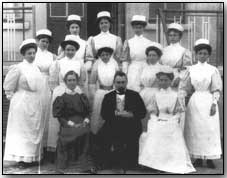Primary Documents - Rev. Stirling Gahan on the Execution of Edith Cavell, 12 October 1915
 Reproduced below is the
account given by British chaplain H. Stirling Gahan of a meeting with
English nurse
Edith Cavell on the night
preceding her execution in Brussels by German military authorities.
Reproduced below is the
account given by British chaplain H. Stirling Gahan of a meeting with
English nurse
Edith Cavell on the night
preceding her execution in Brussels by German military authorities.
Cavell was convicted by the German authorities in occupied Belgium of assisting up to 200 Allied prisoners to escape to Holland and Britain from the hospital where she worked in contravention of German wartime law.
In spite of widespread international protest over the sentence Cavell was duly executed by firing squad on the night of 12 October 1915.
Click the links below to read contemporary letters and reports on Cavell's sentence and death by Brand Whitlock; Maitre G. de Leval; Hugh Gibson; and Arthur Zimmermann.
Account by Reverend H. Stirling Gahan on the Execution of Edith Cavell
On Monday evening, October 11th, I was admitted by special passport from the German authorities to the prison of St. Gilles, where Miss Edith Cavell had been confined for ten weeks.
The final sentence had been given early that afternoon.
To my astonishment and relief I found my friend perfectly calm and resigned. But this could not lessen the tenderness and intensity of feeling on either part during that last interview of almost an hour.
Her first words to me were upon a matter concerning herself personally, but the solemn asseveration which accompanied them was made expressedly in the light of God and eternity.
She then added that she wished all her friends to know that she willingly gave her life for her country, and said: "I have no fear nor shrinking; I have seen death so often that it is not strange or fearful to me."
She further said: "I thank God for this ten weeks' quiet before the end." "Life has always been hurried and full of difficulty." "This time of rest has been a great mercy." "They have all been very kind to me here. But this I would say, standing as I do in view of God and eternity, I realize that patriotism is not enough. I must have no hatred or bitterness towards any one."
We partook of the Holy Communion together, and she received the Gospel message of consolation with all her heart. At the close of the little service I began to repeat the words, "Abide with me," and she joined softly in the end.
We sat quietly talking until it was time for me to go. She gave me parting messages for relations and friends. She spoke of her soul's needs at the moment and she received the assurance of God's Word as only the Christian can do.
Then I said "Good-by," and she smiled and said, "We shall meet again."
The German military chaplain was with her at the end and afterwards gave her Christian burial.
He told me: "She was brave and bright to the last. She professed her Christian faith and that she was glad to die for her country." "She died like a heroine."
Source: Source Records of the Great War, Vol. III, ed. Charles F. Horne, National Alumni 1923
The financial cost of the war is said to have amounted to almost $38 billion for Germany alone; Britain spent $35 billion, France $24 billion, Russia $22 billion, USA $22 billion and Austria-Hungary $20 billion. In total the war cost the Allies around $125 billion; the Central Powers $60 billion.
- Did you know?
